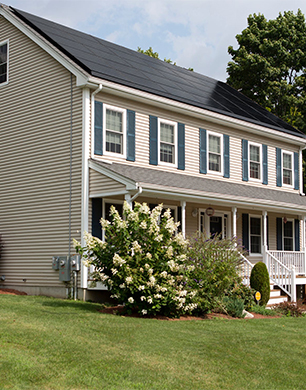
Photo Credit: Vivint Solar, www.pexels.com
We can all play a part in preserving the environment — and it is relatively easy. Aside from recycling and reducing our daily plastic usage we can also make sure our homes are eco-friendly. Not only will your home become more sustainable, but you’ll also be able to save money. So, how can you create an eco-friendly house? Here are three simple ways:
Go Smart
Technology can help make homes energy efficient and lower their carbon footprint (the amount of greenhouse gas, like carbon, that is produced). One technology you can use is a smart metre for your heater. Blue and Green Tomorrow points out that heaters utilise lots of energy, yet people tend to keep them on longer than necessary. Using smart meters can prevent such wastage, as they can be programmed to turn heating on and off at set times only. This simple investment will reduce your home’s carbon footprint, as well as its energy bill.
The same goes for investments in other smart appliances, such as refrigerators and lighting. Using smart appliances lets you monitor energy use, and even decrease it through automation. Many devices can significantly lower the amount of water you use, which ultimately reduces your home’s environmental impact.
Harvest Rainwater
Wrap’s paper on rainwater harvesting details that you can save as much as £300 a year in water and wastewater charges if the annual rainfall amounts to 0.6 metres, and you have a roof area of 15 x 20 metres. As the UK regularly experiences rainfall, taking advantage of this is a great way to reduce your home’s environmental impact without breaking the bank. You’ll be able to repurpose rainwater to water your lawn, wash your vehicles, and also flush the toilet
Having said that, plumbing for your rainfall harvesting system (RHS) will need to be connected to your main plumbing system in order for it to be used with any toilets and sinks. This will ensure cross-connection control, or the ability to switch from using the RHS to your main connection and vice versa. It is, therefore very important that you check this interconnected plumbing system regularly, to ensure the integrity of all pipes. HomeServe underscore the importance of maintaining your property’s plumbing system, and getting it properly insured, as burst pipes and blocked drains can be costly to fix. Especially if you have converted or enhanced your home’s plumbing to accommodate something like collecting and using rainwater. So, do make sure that everything is checked out thoroughly before, during, and after installing your RHS, to avoid any repairs that will damage both the home and your ability to be sustainable.
Invest in Solar Panels
Using solar energy will lessen your reliance on the country’s big energy firms. And with improvements in photovoltaic technology, as well as the development of storage batteries, it is now possible to actually generate enough energy to power your home. On average, houses in the UK require approximately 4kWs of capacity. That means a home will need at least 4 solar panels, each with 1kW of capacity and worth around £1,250, to meet its energy requirements. It’s a considerable investment, but one that’ll save you £6,500 from your energy bill over a 10-year period (it could be higher given increasing energy rates).
More importantly, tapping into a renewable source of energy will reduce your home’s carbon footprint, and you can even sell surplus energy back to energy companies in the UK. Under the Smart Export Guarantee (which replaced the Feed-in Tariff scheme), customers who put surplus renewable energy back into the national grid and will be compensated by big energy companies, like EDF Energy and Npower. Keep in mind: solar energy needs to be utilised upon generation; otherwise it will just be wasted (unless you install a battery for storage, which will cost you at least £3,000 more). But through this scheme, you are ensuring that this energy is actually utilised, and not wasted.
So, what about you? Have you got your own eco-friendly suggestions? Hit us up at StyleNest and tell us about them. Together we can all preserve the environment and do our bit for climate change.

